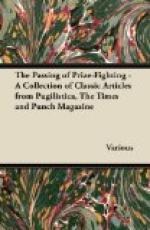Tuesday, March 18th.—GILBERT’S fanciful description of the “most susceptible Chancellor” is justified by the way in which the present occupant of the Woolsack and his predecessors vie with one another in the endeavour to secure the favour of the fair sex. Today it was Lord HALDANE’S turn to oblige, and he brought in a Bill to enable Scotswomen to become Advocates and Law Agents. Lord HALSBURY’S contribution to the work of feminine emancipation has not yet been announced. The rumour that a deputation of ladies recently approached him with a proposal that they should be eligible for judicial office—“Scarlet and ermine are so becoming”—and that he put them off with the old joke about there being “enough old women on the Bench already” is, of course, apocryphal.
Not infrequently in the official reports of the Lords’
debates a speech begins thus: “Lord ——
(who was indistinctly heard).” The
Commons’ report might well adopt this salutary
practice as a warning to Members who persistently
mumble, or who address their remarks to the body of
the House instead of to the SPEAKER. Ministers
are the worst offenders. One of them was asked
this afternoon, for example, whether the Judicial
Adviser to the SULTAN had discouraged the use of the
English language in the Egyptian Courts, but all we
could hear of the sotto voce conversation between
him and his interrogator was that “er—er&md
ash;language—er—had—been—er—er—misunderstood.”
Some savages, travellers tell us, are unable to count beyond five. Some Ministers, on the other hand, show an inability to reckon except in millions. Mr. CHURCHILL, when asked how many soldiers were not receiving the recent increase of pay, remarked casually that the numbers were “not so very great—half-a-million would cover them.” Happily these “sloppy statistics” (to recall a phrase used by Mr. ASQUITH during the Tariff Reform controversy) do not appeal to the FOOD-CONTROLLER. He, being invited to say whether the Government had made “approximately L2,400,000” by the charge on cattle-sales, replied that the amount was “approximately” L3,449,939; and we felt that he was cut to the heart at not being able to give the odd shillings and pence.
The renewed debate on the Transportation Bill revealed a good deal of opposition. Roadmen thought it an excellent project for railways; railwayman were all in favour of its being applied to docks; and dockmen had no objection to its being tried on the roads. But none of them wanted it for his own particular interest. Sir EDWARD CARSON’S objections were both particular and general. Belfast would be ruined if its port were controlled by “a nest of politicians” in Dublin, but apart from that he doubted whether the promised economies would be realised in any direction. Ministers were “gluttons for centralisation,” and would, he prophesied, incur the usual fate of gluttons, acute indigestion.
Mr. BONAR LAW, while admitting that he himself would not have voted for the Bill five years ago, declared that the War had made it essential. That seemed to be the general opinion, for the second reading was agreed to without a division.




